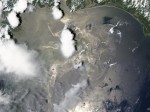 I don’t post the following to make people feel sad. I post it because there are those out there that need to wake up and really see one of the many tragic consequences of our petroleum-fueled lifestyles, and what it is doing to the world we live in and depend on for our very existence. [Cropped satellite image from NASA Earth Observatory, image of the day.]
I don’t post the following to make people feel sad. I post it because there are those out there that need to wake up and really see one of the many tragic consequences of our petroleum-fueled lifestyles, and what it is doing to the world we live in and depend on for our very existence. [Cropped satellite image from NASA Earth Observatory, image of the day.]
This tragedy is the direct result our our addiction to oil, pure and simple. BP was simply the instrument we used to produce it. The Ixtoc spill in the waters off Mexico in 1979 should have been a wake up call. The Exxon Valdez spill in Alaska should have been a wake up call. All the oil spills around the world should have been wake up calls. Sadly though we have gotten too good at ignoring and forgetting. That has to change.
Change is going to come from each of us, as individuals, making conscious choices to reduce our dependence on oil and our impact on mother earth. Real change always happens from the level of the individual and then moves up though higher and higher levels of society as a whole. If you are looking for real change to come from the top down be prepared for a very long wait. True change though cannot happen until we each realize who we really are, and that we are not only all connected to one another, but to all life everywhere; the whole continuum from the smallest one-celled organisms to the Source of all life itself.
The Christian Science Monitor ran a story today titled “Gulf oil spill’s wildlife toll: sharks near shore, turtles incinerated” that I humbly suggest you read. The Christian Science Monitor I find to be a news organization with integrity and a good source of truly “fair and balanced” reporting (unlike the news organization that touts being “fair and balanced”). At the end of that story is a link to a slideshow called “Sticky mess: The Gulf oil spill’s impact on nature” that I again suggest you view. Then spend a little time thinking about what you can do personally to reduce your burden on this wonderful world. If enough people choose to make even small changes, the combined impact of those small changes can be dramatic.
One such change we can all make (and Obama, unfortunately, got a lot of flack for this during his campaign for President) is to check our tire pressure regularly and keep our tires properly inflated. According to the US Department of Energy, underinflated tires cost the US 1.25 billion gallons of gas per year; about 1 percent of our total gas consumption. One bonus to keeping our tires properly inflated is our tires will last longer. Another is that we reduce the amount of greenhouse gases we put into the atmosphere. There is no downside.
Recent Comments